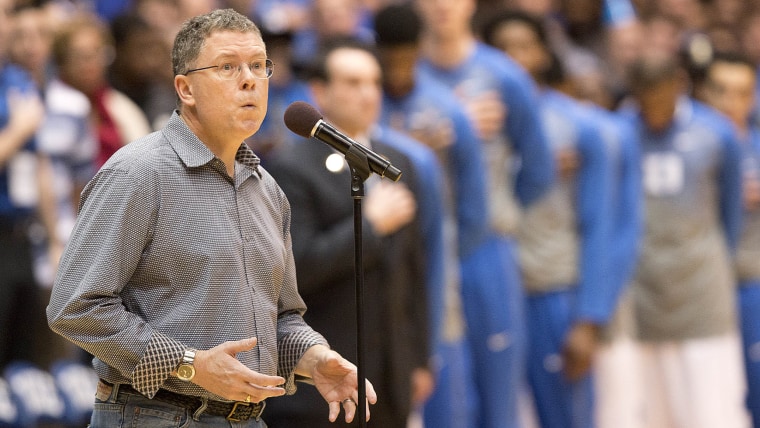Your lips let you talk, kiss, pout and smile. For Chris Ullman, they’re also the perfect musical instrument.
Ullman is one of the best whistlers in the world — a four-time grand champion in international and national whistling contests. When you’re that good, your lips are a priority and everyday habits like kissing can impact the quality of the sound.

Ullman started whistling at 5 and developed his skills as a teenager when he whistled for two hours a day on his paper route in Long Island, New York.
Now 52 and based in Washington, he’s been invited to whistle at the White House, perform with symphony orchestras and open sporting events with his rendition of the U.S. National Anthem. He was inducted into the International Whistlers Convention Hall of Fame in 2012
In addition to traditional lip whistling, Ullman can whistle with his tongue, producing sounds that “make the music a little more interesting,” he told TODAY.
Though he’s retired from competing, Ullman continues to perform. He recently shared his routine with TODAY and the following is an edited version of that interview.
How do you take care of your lips and prepare for a performance?
You have to develop your embouchure, which is a term that applies to people who play wind instruments, like a trumpet or clarinet. It is the shape of your lips and their conditioning.
Forming a pucker is not a natural position for your lips. As a result, your lips will get tired very quickly, so you have to condition them and practice so you can sustain the right shape. That’s critical.
I have a no-kissing rule 24 hours before a performance, because it makes your lips mushy. You want your lips to be supple, but not too mushy.
Lubrication: You want your mouth and your lips to be moist, but if you drink too much water, it has a counterproductive effect. Like licking your lips, which does not make them moist; it makes them dry because it removes the natural oils. Same thing here: If you just chug all this water before whistling, it’s going to remove the natural saliva and your mouth will actually become dry.
So what I do is I very gently sip ice water. The ice water keeps the surface of the lips smooth.
I’m also addicted to ChapStick.
What’s your favorite music to whistle?
First of all, “Happy Birthday.” I whistle 400 “Happy Birthdays” a year for friends, family, strangers in restaurants, you name it. Whistling “Happy Birthday” is a big priority for me because it makes me happy and I get to celebrate people’s lives.
Beyond that, I love to do jazz and blues because I like improvisational whistling. I love whistling classical music and I’ve performed with a number of symphony orchestras over the years. Mozart’s Oboe Concerto is a 22-minute orchestral piece with a solo oboe and I perform the oboe part.
I also love show tunes.
Related: 4 reasons we love sad songs: Unexpected rewards of melancholy music
Is there anything particularly hard to whistle, like the U.S. National Anthem, with which singers often struggle?
The National Anthem is tough for a couple of reasons. One is that everyone knows the piece really well so you have to do it really well.
Second, is that since everyone knows it really well, you have to be very creative in how you do it, but still be respectful.
You have to start in the right note to make sure you’re able to hit that extra high note. I have a pitch pipe so I blow the correct note just so I can hear it so I start in the right key.
In classical music, whistling a 22-minute piece with a symphony orchestra is astoundingly difficult. The Mozart piece that I’ve done has a lot of very long complex runs in it. But that’s what makes it fun.
Do you consider yourself a musician?
Absolutely. That process of turning notes into music applies regardless of what your instrument is.
People say to me, ‘Do you rehearse?’ Of course. If you want to be good at anything, you have to practice.
Related: Sorry, Pharrell. Music doesn't make everyone happy, study shows
What are your tips for people who want to be better whistlers?
First, practice a lot.
Second, find music that is challenging, that pushes you to learn new techniques, expand your range, and that has both slow parts and fast parts so you’re pushing your abilities.
A critical thing is to be very objective with oneself and to seek constructive input from people because if everyone just tells you how great you are, you’ll never become great. You have to have an attitude that’s all about constant improvement.
You have to love to rehearse. If rehearsal is a drudgery, you’ll never become great.
What’s your daily routine?
My main rehearsal music is Strauss waltzes. It’s the perfect warm up music because it is technically challenging, has slow and fast parts, a wide range of highs and lows, and it’s astoundingly melodic, meaning it’s actually enjoyable. It’s fun to do it over and over again.
I’ve probably whistled more Strauss than any other human alive. I’ll whistle it 30-40 minutes every day.
Does your family ever get sick of you whistling all the time?
I actually don’t whistle around the house very much. Random, idle whistling is very annoying.